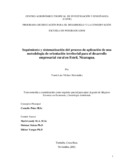| dc.contributor.author | Vílchez Hernández, Yanni L. | |
| dc.date.accessioned | 2014-10-20T05:05:34Z | |
| dc.date.available | 2014-10-20T05:05:34Z | |
| dc.date.issued | 2003 | es_ES |
| dc.identifier | 365873 | es_ES |
| dc.identifier.uri | https://repositorio.catie.ac.cr/handle/11554/5148 | |
| dc.description | Tesis (M. Sc) -- CATIE, Turrialba (Costa Rica), 2003 | es_ES |
| dc.description.abstract | Durante el 2003 se sistematizó y analizó la Alianza de Aprendizaje suscrita entre el proyecto RENACER de Cooperative for Assistance and Relief Everywhere (CARE) en Nicaragua y el Proyecto de Desarrollo Agroempresarial Rural del Centro Internacional para la Agricultura Tropical (CIAT) con el propósito de identificar algunas reglas generales y lecciones aprendidas dentro del proceso de aplicación de la metodología de desarrollo empresarial rural (OT-DER) para incorporar mejoras surgidas de la experiencia local en dicha metodología. Como resultado de la sistematización y el análisis se encontró que las Alianzas de Aprendizaje son un buen medio para ampliar las áreas de impacto de los organismos de desarrollo y la aplicación a mayor escala de las metodologías de los centros de investigación sin sacrificar presupuesto adicional y calidad. Por otro lado se identificó que sustituyendo la estructura de aplicación utilizada en Estelí se puede facilitar el empoderamiento de las bases en la metodología OT-DER a través del aprender-haciendo en línea en Rosemberg (1982) y Dowthwaite, et al (2001) y a la vez disminuir la posibilidad de realizar cambios inapropiados a la OT-DER. | es_ES |
| dc.description.abstract | The Learning Alliances being implemented by CARE's RENACER project and CIAT's Rural Agro-Enterprise Development project was systematized and analyzed for the purposes of identifying general rules and lessons learnt in the application of the rural enterprise development methodology (OT-DER) and of incorporating recommended improvements based on local experience. It was found that the Learning Alliances were a good means by which to broaden the impact of development organizations and to more widely disseminate technologies stemming from research centers without greater cost or loss of quality. It was also found that, by substituting the application structure utilized in Estelí, the grass-roots level could be empowered in applying the OT-DER methodology through learning-by-doing - as described by Rosenberg (1982) and Douthwaite et al (2001) -, whilst reducing the possibility of causing inappropriate changes to the OT-DER. | |
| dc.language.iso | es | es_ES |
| dc.publisher | CATIE, Turrialba (Costa Rica) | es_ES |
| dc.subject | ENTERPRISES | |
| dc.subject | SOCIOECONOMIC DEVELOPMENT | |
| dc.subject | RURAL DEVELOPMENT | |
| dc.subject | APPRENTICESHIP | |
| dc.subject | TRAINING | |
| dc.subject | METHODS | |
| dc.subject | INFORMATION SERVICES | |
| dc.subject | DATABASES | |
| dc.subject | RESEARCH | |
| dc.subject | SOCIAL PARTICIPATIONEMPRESAS | |
| dc.subject | DESARROLLO ECONOMICO Y SOCIAL | |
| dc.subject | DESARROLLO RURAL | |
| dc.subject | APRENDIZAJE | |
| dc.subject | CAPACITACION | |
| dc.subject | METODOS | |
| dc.subject | SERVICIOS DE INFORMACION | |
| dc.subject | BASES DE DATOS | |
| dc.subject | INVESTIGACION | |
| dc.subject | PARTICIPACION SOCIAL | |
| dc.subject | NICARAGUA | |
| dc.title | Seguimiento y sistematización del proceso de aplicación de una metodología de orientación territorial para el desarrollo empresarial rural en Estelí, Nicaragua | |
| dc.title.alternative | Follow-up and systematization of the application process of a methodology for territorial orientation for rural enterprise development in Estelí, Nicaragua | |
| dc.type | Tesis de maestría | es_ES |
| dcterms.rights | acceso abierto | es_Es |
| dc.identifier.publication | Turrialba (Costa Rica) | es_ES |


